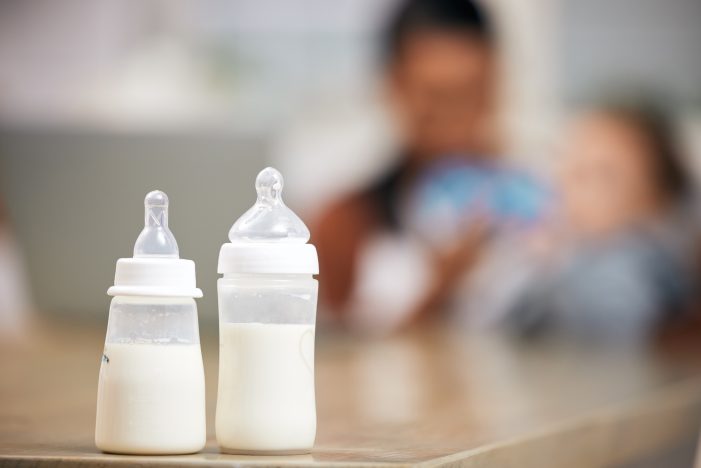
In 1981, the World Health Assembly released a public health strategy known as The International Code of Marketing of Breast-Milk Substitutes to protect breastfeeding and “stop the aggressive and inappropriate marketing of breast-milk substitutes.”1 This initiative came after years of unethical formula marketing specifically to mothers in low-income parts of the world, which led to “dramatic increases in maternal and infant morbidity and mortality rates”.2
Over 40 years after the International Code was put into place, the World Health Organization (WHO) has released a report about the “shocking” extent of continued exploitative marketing of formula to vulnerable mothers, citing the market’s promotion of formula as “aggressive” and “misleading.”1
The two-part report specifically outlines digital marketing, with formula companies using advice forums and paying social media platforms and influencers to promote their products. The report states that the industry is gaining access to mothers in the most vulnerable moments of their lives by utilizing social media content that may not be recognizable as typical advertising.1
The report1 compiled findings from a research sample that analyzed four million social media posts about infant feeding published over the course of six months. The analysis found that social media posts collectively reached 2.47 billion people with formula companies uploading content 90 times per day, reaching 229 million users. The commercialized formula content reached three times as many people as informational posts about breastfeeding. The WHO, which recommends exclusively breastfeeding until age two, states this pervasive marketing is increasing formula purchases and dissuading mothers from breastfeeding exclusively.
Social Media Formula Marketing in Violation of International Marketing Codes
Francesco Branca, MD, PhD, director of the WHO Nutrition and Food Safety Department stated:
The promotion of commercial milk formulas should have been terminated decades ago. The fact that formula milk companies are now employing even more powerful and insidious marketing techniques to drive up their sales is inexcusable and must be stopped.1
This digital marketing is in direction violation of The International Code of Marketing Breast-Milk Substitutes which explicitly states that there should be no advertising to the general public, including through mass media outlets. According to Nigel Rollins, MD, WHO scientist and lead author of the report, the amount of marketing is not the only problem. Equally alarming is how algorithm-driven marketing tries to “exploit emotions, the fears and the ambitions of women and families at a time they’re potentially most vulnerable.”3
In a press conference, Dr. Rollins also stated that formulas are positioned as equivalent or even superior to breastmilk, which is not based upon scientific evidence, and that such inaccurate marketing disrupts objective, truthful information that enables a mother to make the best decision for her baby. While there are many factors that go into these decisions when considering breastmilk versus formula, commercial interests shouldn’t be one of them, Dr. Rollins said.3
Nestle Formula Marketing Campaign Results in Malnourished Infants
Nestle has long been a global market leader in the formula industry. In the 1970s, widespread outrage against Nestle ensued when the formula giant was accused of getting mothers in third world countries, who “yearned for westernization,” dependent on formula for their babies. Nestle distributed pamphlets and formula samples and hired saleswomen dressed in nurse uniforms to promote the products to mothers in poverty-stricken cities. Many mothers, who could not afford the formula after the samples were gone, would water down the breastmilk substitute, resulting in malnutrition of the infants. The allegations against Nestle led to hearings in both the Senate and World Health Organization, thus leading to The International Code of Marketing of Breast-Milk Substitutes.4
American Academy of Pediatrics Receives Funding from Formula Industry
The International Code also states that companies should not sponsor meetings of health professionals or scientific meetings, yet the American Academy of Pediatrics (AAP) accepts money from formula companies on both a national and state level. An article written by the United States Lactation Consultant Association (ISLCA) states:
Both the AAP and the formula companies are complicit in violating of the 2016 WHO guidance… The acceptance of funding from formula companies is clearly incompatible with the promotion of breastfeeding.5
The Code is internationally agreed upon but only 25 countries have actual legislation that covers the Code in its entirety. China and the United States—the two largest formula markets are not amongst them.3
WHO Says Increasing Breastfeeding Levels Could Save Lives
The WHO states that breastfed children are less likely to become overweight or obese, less likely to develop diabetes, and perform better on intelligence tests. Benefits to the mother include reduced risk of breast and ovarian cancers. Increasing breastfeeding to near-universal levels could save more than 820,000 lives per year.
A statement from WHO reads:
Breastfeeding is unparalleled in providing the ideal food for infants. Breast milk is safe, clean and contains antibodies which help protect the infants against many common childhood illnesses. The protection, promotion and support of breastfeeding rank amongst the most effective interventions to improve child survival.2
If you would like to receive an e-mail notice of the most recent articles published in The Vaccine Reaction each week, click here.
Click here to view References:
No comments:
Post a Comment